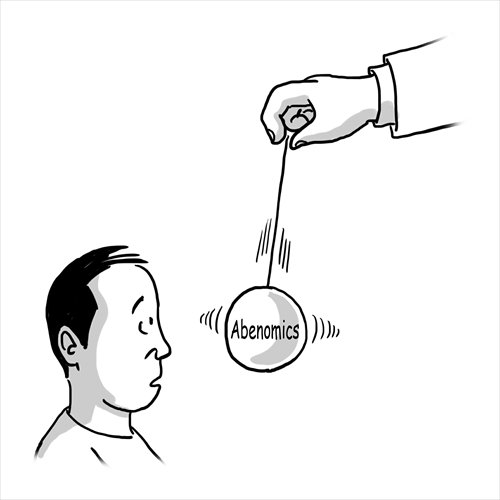Abenomics could empower risky constitutional shift in Japan

Illustration: Liu Rui/GT
The coming Upper House elections will be historic ones affecting Japan's destiny, Japanese Communist Party leader Kazuo Shii claimed in Tokyo last Wednesday. As Shii said, the election results will have a fundamental influence on Japan. According to the constitution, a formal constitutional amendment requires approval by two-thirds of both houses of parliament and should be proposed by the Diet. Since 2012, Shinzo Abe-led Liberal Democratic Party (LDP) and Komeito have won three consecutive victories, guaranteeing a two-thirds majority at the Lower House. Therefore, the July election will determine Japan's future.
A total of 121 seats, half of all the seats in the Upper House, will be contested in summer. With 76 seats in the Upper House already, the LDP and Komeito have to win at least 61 seats in July. This, together with a handful of opposition votes, is a prerequisite to launching a constitutional amendment proposal. The constitution tops the agenda in this election.
Abe proposed last week that the commissions on the constitution in both houses of the Diet resume discussions on constitutional amendment after the election. This reflects Abe's confidence in his LDP and Komeito candidates.
However, Abe is always playing the "economy" card, emphasizing the success of Abenomics and deliberately avoiding constitution-related topics in his pre-election speeches. While the constitution was discussed in speeches last week by leaders of Komeito, the Democratic Party and the Communist Party, Abe made no mention of constitution-related topics, but spent almost half of the time on the success of his economic policies.
In fact, maintaining the current constitution is a mainstream opinion in Japan. Polls by the Mainichi Shimbun newspaper suggest that 48 percent respondents oppose constitutional amendment, compared with 31 percent in favor of amendment.
Abe's avoidance of constitution-related topics may be a strategy for the election, but in fact is a denial of reality. Atrophying press freedom and Abe's ramming through the security bills have harmed the authority of the constitution. Thus, Abe, by deliberately avoiding mentioning the constitution, has indirectly acknowledged the damage he has done to the law.
Abenomics is another hot topic in the Upper House election. While the LDP and Komeito repeatedly stressed Abe's economic achievements, opposition parties criticized Abenomics as a failure. Yet Abenomics has achieved outstanding results, successfully stimulating the Japanese economy. An influx of overseas tourists to Japan in recent years is a result of the yen's devaluation. Statistics from the Asahi Shimbun suggest that after the implementation of Abenomics, the exchange rate went from 82 yen to the dollar to 111, and the Nikkei 225 average skyrocketed from 9,446 yen to 17,234 yen.
But there are still significant worries. In the meantime, Japan suffers the heaviest debt burdens among the developed countries; income increase remains quite slow for ordinary citizens, and individual consumption, which occupies about 60 percent of Japan's GDP, is still sluggish.
In addition, Japan's stock prices dived following the UK's EU referendum, reflecting the limited effects of Abenomics. As the core of Abenomics, the yen's devaluation and Japan's stock prices are susceptible to exterior economic environment, of which the Japanese voters must have been aware.
After Abe decided to postpone the consumption tax hike in November 2014, the LDP and Komeito won the Lower House election in December that year. This time, Abe once again violated the election rules and announced the postponement of the consumption tax hike. Abe clearly wants to have more chips for the election. The policy's effects on the election need to be observed.
Despite its merits, Japan's representative democracy has a number of drawbacks. Voters care more about immediate interests than long-term benefits, which may indirectly bring chaos among society.
Abe has already won the victory in the Lower House election. We hope Japanese voters, especially those young people participating in the election for the first time, can cast a responsible vote for Japan's future.
The author is a PhD candidate at the Graduate School of Sociology at Toyo University. opinion@globaltimes.com.cn